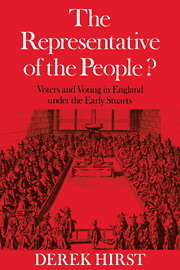Book contents
- Frontmatter
- Contents
- Acknowledgements
- Abbreviations and notes
- 1 Introduction
- PART I THE ELECTORATE
- PART II ELECTIONS
- PART III AFTER THE ELECTION
- Appendices
- I Constituencies experiencing franchise disputes 1604-41
- II Case studies of disputes
- III The borough franchises in 1641
- IV Contested elections
- V Numbers of voters
- VI Voting and occupations in Hertford
- VII The provisions of bills to regulate elections
- VIII The arguments for a wider franchise
- Notes
- Bibliography
- Index
VII - The provisions of bills to regulate elections
Published online by Cambridge University Press: 15 December 2009
- Frontmatter
- Contents
- Acknowledgements
- Abbreviations and notes
- 1 Introduction
- PART I THE ELECTORATE
- PART II ELECTIONS
- PART III AFTER THE ELECTION
- Appendices
- I Constituencies experiencing franchise disputes 1604-41
- II Case studies of disputes
- III The borough franchises in 1641
- IV Contested elections
- V Numbers of voters
- VI Voting and occupations in Hertford
- VII The provisions of bills to regulate elections
- VIII The arguments for a wider franchise
- Notes
- Bibliography
- Index
Summary
There were recurrent attempts to enforce residence requirements for members, but this account is not concerned with those, but only with efforts to reform elections and the electorate. These focused primarily on resisting influence from above – although this could also be seen as the aim of residence measures.
1606: Introduced by Christopher Brooke: no clients of noblemen or other parliament men to be chosen; none to be chosen ‘upon any letters Mandatory or of Request, nor for Money or other Gift’. Willson, Parliamentary Diary of Robert Bowyer, 100.
1614: the details are unrecorded, but its concern was clearly the same as that of 1606, to prevent influence. Sir Henry Anderson protested against carpet-baggers, and Serjeant Montague demanded that none ‘should come in by Letter, for the only Way to bring in Servitude’. This was evidently a common demand, for Sir Edwin Sandys had earlier drawn a distinction between nobles' letters ‘to whom they bound in Love’ which was not packing, whereas ‘to press with Letters, or by Fear, etc.’ was. Sir Francis Goodwin protested against the frequency of disputes, and that mayors and bailiffs were returning themselves, and demanded ‘a plain Law’ to clarify elections. Hake will was concerned with the bill also, which clearly arose from the Stockbridge affair: as Montague said, ‘This a fit Subject for a necessary Law’. C.J., 1, 463, 468, 478, 494.
- Type
- Chapter
- Information
- The Representative of the People?Voters and Voting in England under the Early Stuarts, pp. 229 - 231Publisher: Cambridge University PressPrint publication year: 1975



